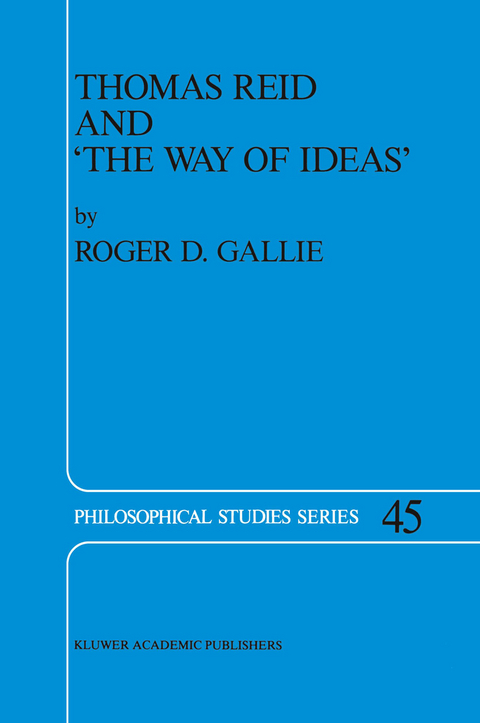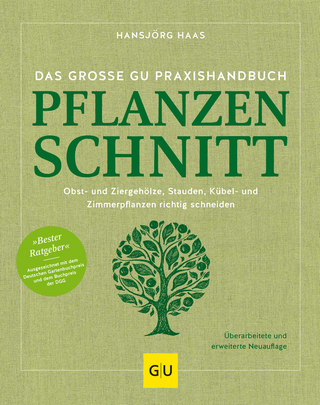
Thomas Reid and ‘The Way of Ideas’
Springer (Verlag)
978-94-010-7599-2 (ISBN)
I: Investigating our Mental Powers.- 1.1 Hume: Thinking versus feeling.- 1.2 Reid: Conception versus sensation.- 1.3 Laws of our constitution and epistemologically prior principles.- 1.4 How to arrive at laws of nature.- 1.5 Scientific study of the mind?.- II: The Ideal Hypothesis.- 2.1 Ideas as objects of perception.- 2.2 Perception and impressions on the mind.- 2.3 Perception by way of perceiving images.- 2.4 Is the table we see an image?.- 2.5 The role of sensation in perception.- III: The Epistemological Role of Perception.- 3.1 Is there fallacy of the senses?.- 3.2 The appearance of objects to the eye.- 3.3 Reliance on the senses.- IV: The Constituents of Reality.- 4.1 The testimony of the senses and the world of material bodies.- 4.2 Primary versus secondary qualities.- 4.3 Colour versus shape.- 4.4 Are there other minds than mine?.- 4.5 An intelligent Author of Nature?.- V: What Words Signify.- 5.1 Locke’s theory of signification.- 5.2 What proper names and general words signify according to Reid.- 5.3 Individual and general conceptions.- 5.4 Whether proper names signify attributes.- 5.5 The variety of objects of conception.- 5.6 Conceiving the real and the unreal.- 5.7 Attributions to conceivable individuals.- 5.8 Things objectively in my mind.- VI: Active Power.- 6.1 Knowingly giving rise to new actions.- 6.2 Locke on active power.- 6.3 Reid’s account of active power.- 6.4 Difficulties within Reid’s account.- 6.5 Divine prescience and active power.- 6.6 Is every future event already determined?.- 6.7 Moral attributions and active power.- VII; Causality.- 7.1 Concerning some criticisms of Hume’s view of the causal principle.- 7.2 No proof of the causal principle available within Hume’s philosophy.- 7.3 Past instances and the uniformity of nature.- 7.4Presupposition and the authority of experience.- 7.5 Reid’s notion of cause.- 7.6 Wisdom, prudence and causal law.- VIII: Identity and Continuity.- 8.1 The sameness of a person.- 8.2 Amnesia and the same person.- 8.3 The Brave Officer paradox.- 8.4 The sameness of plants and artefacts.- 8.5 What is found on entry into the self.- 8.6 Consciousness and awareness of self.- 8.7 Memories and personal identity.- IX: Of Common Sense and First Principles.- 9.1 How to detect first principles.- 9.2 First principles and modes of argument.- 9.3 Our faculties are not fallacious.- 9.4 The first principles to be employed in the investigation of the mind.- 9.5 Accounting for beliefs.- 9.6 First principles and judgments.- 9.7 Providential Naturalism.- Notes.
| Reihe/Serie | Philosophical Studies Series ; 45 |
|---|---|
| Zusatzinfo | XXII, 287 p. |
| Verlagsort | Dordrecht |
| Sprache | englisch |
| Maße | 155 x 235 mm |
| Themenwelt | Sachbuch/Ratgeber ► Natur / Technik ► Garten |
| Geisteswissenschaften ► Geschichte | |
| Geisteswissenschaften ► Philosophie ► Allgemeines / Lexika | |
| Geisteswissenschaften ► Philosophie ► Erkenntnistheorie / Wissenschaftstheorie | |
| Geisteswissenschaften ► Philosophie ► Sprachphilosophie | |
| ISBN-10 | 94-010-7599-9 / 9401075999 |
| ISBN-13 | 978-94-010-7599-2 / 9789401075992 |
| Zustand | Neuware |
| Haben Sie eine Frage zum Produkt? |
aus dem Bereich


